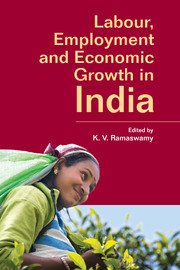Book contents
- Frontmatter
- Dedication
- Contents
- List of Tables and Figures
- Preface
- Part 1 Economic Growth and Employment
- 1 Introduction and Review of Issues
- 2 India's Labour Market during the 2000s
- 3 Services-led Growth and Employment in India
- 4 Growth, Structural Change and Poverty Reduction
- 5 Age Structure Transition, Population Ageing and Economic Growth
- 6 Labour Intensity in Indian Manufacturing
- 7 Gender Discrimination in Manufacturing Employment in India, 1999-2009
- Part 2 Employment and Labour Law
- Contributors
- Index
7 - Gender Discrimination in Manufacturing Employment in India, 1999-2009
from Part 1 - Economic Growth and Employment
Published online by Cambridge University Press: 05 June 2015
- Frontmatter
- Dedication
- Contents
- List of Tables and Figures
- Preface
- Part 1 Economic Growth and Employment
- 1 Introduction and Review of Issues
- 2 India's Labour Market during the 2000s
- 3 Services-led Growth and Employment in India
- 4 Growth, Structural Change and Poverty Reduction
- 5 Age Structure Transition, Population Ageing and Economic Growth
- 6 Labour Intensity in Indian Manufacturing
- 7 Gender Discrimination in Manufacturing Employment in India, 1999-2009
- Part 2 Employment and Labour Law
- Contributors
- Index
Summary
Introduction
There have been a number of studies on gender discrimination in India. A common finding of these studies is that after controlling for endowments and certain other factors, the wages received by women are relatively lower than those received by men (see, for instance, Reilly and Vasudeva-Dutta, 2005; Menon and Rodgers, 2007; Khanna, 2012; Krishna and Bino Paul, 2012; and Paul and Paul, 2013). In this chapter, a different dimension of discrimination is studied, namely discrimination in job tenure (regular wage jobs versus casual jobs). The analysis is confined to Indian manufacturing, as in the paper of Menon and Rodgers (2007). The main hypothesis tested econometrically is that after controlling for endowments and industry affiliation, the women tend to get discriminated in the matter of getting regular jobs. A related hypothesis is about the effect of economic reforms, particularly trade liberalization, on gender discrimination. There are reasons to believe that liberalization of trade and industrial policies, inasmuch as it leads to increased competition, will reduce gender discrimination in wages. This view is based on a theory of discrimination (see Becker, 1971). The argument is that gender discrimination is costly and the employers do discrimination despite it being costly because of the nature of their preferences. Hence, the employers will have to curb their preference for discrimination if competitive forces bring down their profit margin.
A question of particular interest to this chapter is the inter-state differences in the extent of gender-based discrimination in manufacturing employment. The focus, as mentioned above, is on the tenure of employment i.e. how far women tend to be discriminated against in the matter of getting regular jobs. It would be interesting to find out which are the Indian states where the extent of gender discrimination in manufacturing employment is relatively high, and the states in which it is relatively low. What is more important is to look for an explanation of the observed inter-state differences.
- Type
- Chapter
- Information
- Labour, Employment and Economic Growth in India , pp. 181 - 218Publisher: Cambridge University PressPrint publication year: 2015
- 2
- Cited by



